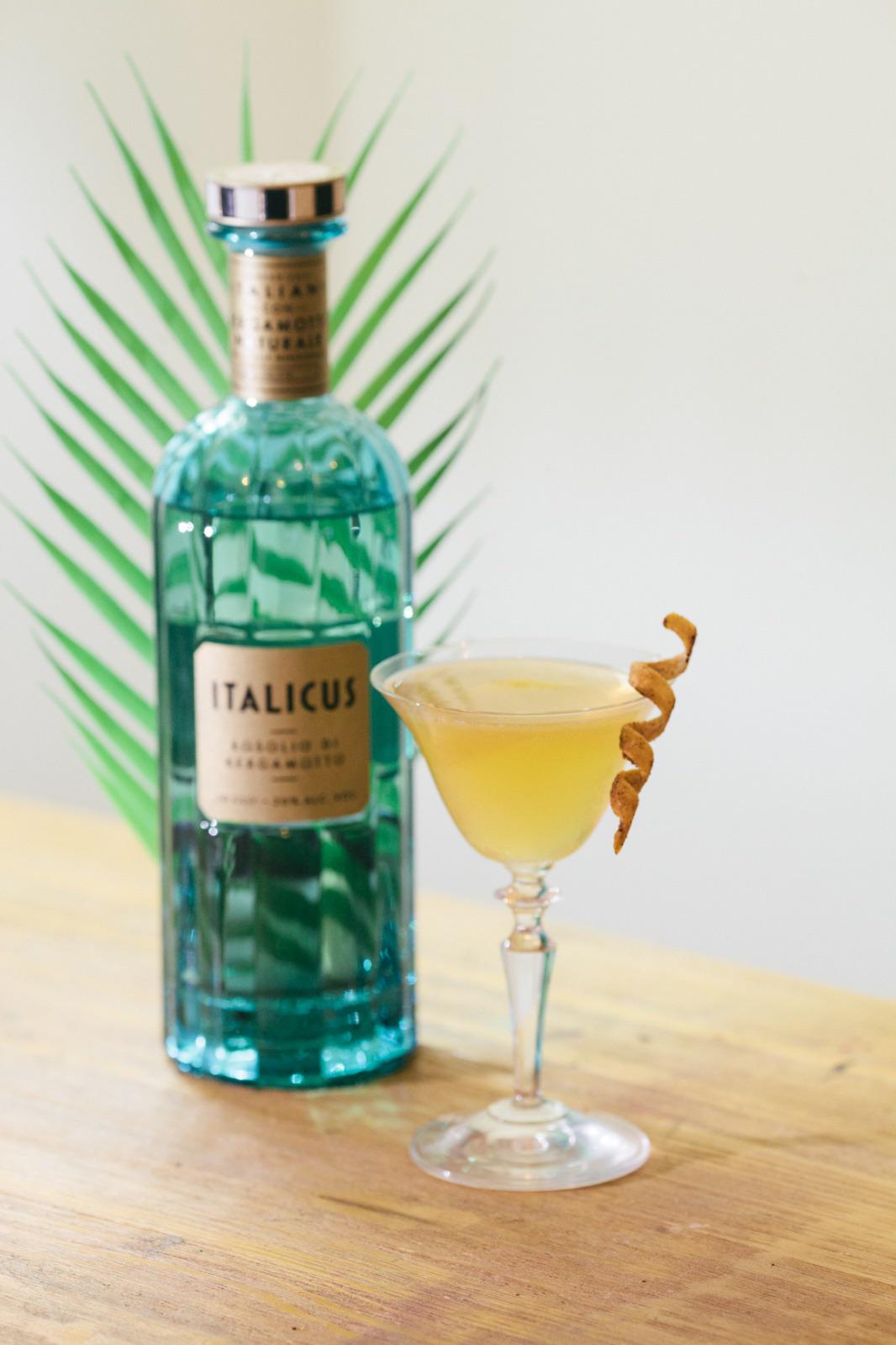This guide will immerse you in the vibrant world of Italicus cocktails, offering 20+ refreshing recipes and a deep dive into this unique Italian aperitivo. Whether you’re a seasoned mixologist or a curious home bartender, you’ll discover how to create stunning Italicus cocktails that tantalize the taste buds.
Discovering the Magic of Italicus
Italicus Rosolio di Bergamotto is more than just a liqueur—it’s an Italian masterpiece. This vibrant spirit captures the essence of bergamot, a citrus fruit with a distinct floral aroma, and blends it with a medley of other citrus fruits, herbs, and delicate floral notes. Think sunshine in a bottle, with a touch of Italian mystique. This guide will equip you with everything you need to transform your kitchen into a personal Italicus cocktail haven.
Crafting Delicious Italicus Cocktails
Ready to embark on a flavor adventure? We’ve curated over 20 Italicus cocktail recipes, each designed to showcase the liqueur’s versatility. From the light and refreshing Bergamot & Coconut Cobbler to the sophisticated Bergamot Negroni, you’re sure to find your new favorite drink. Each sip is a symphony of flavors, a delightful experience that will transport you to the Italian countryside.
Beyond the Spritz: Unleashing Italicus’s Full Potential
While the classic Italicus Spritz is undeniably delightful, a world of mixology magic awaits beyond this iconic serve. Embrace your inner bartender and experiment with innovative creations like the Coffee & Tonic, where Italicus harmonizes beautifully with the rich notes of coffee and the crispness of tonic water. The result is a surprisingly balanced and captivating blend.
The Art of Presentation: Serving Italicus in Style
Enjoying Italicus is a multi-sensory experience. Whether you’re savoring it neat, on the rocks, or mixed into a cocktail, thoughtful presentation elevates the moment. A simple garnish, such as a twist of citrus peel, a sprig of fresh herbs, or an edible flower, adds a touch of elegance. Selecting the right glassware, from a classic coupe to a modern tumbler, further enhances the visual appeal of your Italicus creations.
A Journey into Italicus: History and Inspiration
Delve into the rich history of Italicus, tracing its roots back to the ancient Italian tradition of rosolio. We’ll explore the story of Giuseppe Gallo, the passionate creator behind this remarkable liqueur, and uncover the inspiration that fueled its creation. This fascinating background adds a layer of appreciation to every sip.
Sourcing Your Own Italicus
Ready to start mixing? You can typically find Italicus at reputable online retailers and specialty liquor stores. The price varies, but it’s generally an accessible luxury. Having a bottle on hand ensures you’re always prepared to infuse a touch of Italian sunshine into any occasion.
Elevating Your Aperitivo: Italicus for Pre-Dinner Delight
Italicus is the quintessential aperitivo, the perfect pre-dinner ritual. Its refreshing flavors awaken the palate, preparing you for the culinary journey ahead. Don’t hesitate to experiment! Incorporate seasonal fruits and herbs into your Italicus concoctions, embracing the liqueur’s adaptability throughout the year.
Beyond the Bar: Italicus in Desserts and Baking
Italicus isn’t confined to cocktails. Its unique flavor profile makes it a surprisingly delightful addition to desserts and baked goods. Imagine the subtle citrus notes of Italicus mingling with the sweetness of a cake or the richness of a creamy dessert. It’s an unexpected twist that adds a touch of Italian flair to your sweet creations.
Frequently Asked Questions (FAQs)
Q: What distinguishes Italicus from other bergamot liqueurs?
A: While other bergamot liqueurs exist, Italicus possesses a distinctive character. It utilizes a specific variety of Calabrian bergamot renowned for its intense aroma and combines it with a carefully selected blend of other citrus fruits, herbs, and flowers. This results in a complex and well-balanced flavor profile that’s difficult to replicate.
Q: What are some alternatives if I can’t find Italicus?
A: Italicus has a unique flavor, but if it’s unavailable, you could experiment with bergamot-infused vodka or a combination of citrus vodka and elderflower liqueur. The taste won’t be identical, but these substitutes might offer a similar vibe.
Q: How long does an opened bottle of Italicus last?
A: Store opened Italicus in a cool, dark place to preserve its quality. Under these conditions, it should remain enjoyable for approximately six months to a year.
Mixing with Italicus: A World of Possibilities
Now, let’s explore the exciting world of mixing with Italicus. This versatile liqueur, with its bright bergamot flavor, offers endless possibilities. From simple spritzes to sophisticated cocktails, Italicus is always up for the occasion.
Effortless Italicus Drinks
- Italicus Spritz: The classic. Combine 2 oz Italicus, 2 oz Prosecco (or your favorite sparkling wine), and 1 oz club soda. Garnish with an orange slice. If you are looking for the perfect drink to enjoy on a sunny morning, look no further than the mimosa drinkki.
- Italicus Tonic: A simple yet satisfying mix. Experiment with different tonic waters to discover new flavor dimensions.
- Hot Day Refresher: A more generous version of the spritz. Combine a splash of Italicus, a good pour of tonic, and top with sparkling wine. Perfect for those scorching summer days. “On a very hot day, in the middle of the day or afternoon, I would do a good measure of Italicus, tonic water and sparkling wine.” – Simone Caporale
Elevating Your Cocktail Game
- Italicus Gin Sour: Add a splash of Italicus to your favorite Gin Sour recipe for a floral twist.
- Italicus Tequila Cocktail: A surprising yet delicious combination. Mix Italicus, tequila, pink grapefruit juice, and a dash of bitters. “Another good combination is tequila and pink grapefruit, a dash of a Bitter and a portion of Italicus.” – Simone Caporale
Signature Italicus Cocktails
- Bergamot & Coconut Cobbler: A tropical delight combining Italicus, Fino Sherry, and coconut water.
- Bergamot Bamboo: A modern twist on a classic cocktail. Italicus, Fino Sherry, and Angostura Bitters create a dry yet elegant profile.
- Bergamot Negroni: A Negroni reimagined with Italicus. The bergamot adds a refreshing brightness to the classic gin, Campari, and sweet vermouth combination. Using an oak-aged gin adds depth.
- Clandestine: A more complex mix of Scotch Whisky, Gentian Liqueur, Italicus, and Honey Syrup.
- Coffee & Tonic: An intriguing blend of Italicus, tonic water, and cold brew coffee.
Italicus in the Kitchen
Italicus isn’t limited to the bar. Its unique flavor profile complements berries, stone fruits, and herbs, making it a surprisingly versatile ingredient in sauces, desserts, and even marinades.
Storage and Serving
Store Italicus in a cool, dark place to maintain its quality. When serving, choose elegant glassware and experiment with garnishes like orange peels or rosemary sprigs.
The Taste of Italicus: A Sensory Exploration
Italicus offers a complex and nuanced flavor profile, a symphony of carefully orchestrated notes. The dominant flavor is bergamot, a citrus fruit with a unique sweet, floral aroma distinct from other citrus like lemons or limes. This bright citrus is balanced by a gentle bitterness from botanicals such as gentian, chamomile, lavender, and melissa balm. Woven throughout are hints of rose, orange blossom, and a subtle touch of rosemary, creating a layered and intriguing taste experience. Some even detect a grassy or hay-like nuance, which further adds to its complexity.
Individual taste perceptions may vary. While the general profile leans towards sweet, with a honeyed quality, the balance of bitterness and other botanicals prevents it from being cloying. Some may perceive the floral notes more prominently, while others might find the citrus more pronounced. This complexity allows for personal interpretation, making each sip a unique discovery.
Scientists are actively researching how genetics and personal experiences influence taste perception. Ongoing studies explore how factors like temperature and other ingredients can subtly alter our experience of flavors. Thus, while we can describe the general profile, the ultimate experience is subjective. It encourages you to explore your own palate and discover the nuances within this captivating liqueur. If you’re a fan of religious satire, then you’ll definitely want to check out Lamb: The Gospel According to Biff, Christ’s Childhood Pal.
Italicus Flavor Profile: A Deep Dive
Let’s delve deeper into the captivating flavor profile of Italicus. It’s a multi-faceted experience where citrus, floral, and herbal notes intertwine harmoniously.
The star is undoubtedly bergamot, a citrus fruit with a distinct character. Sourced from Calabria, Italy, it offers a sweet yet slightly bitter taste, setting it apart from other citrus fruits. But Italicus is more than just bergamot. It embodies a symphony of flavors. Delicate floral notes of rose, lavender, and orange blossom dance alongside the citrus, adding layers of complexity and a touch of romance. Herbal hints of gentian, chamomile, and melissa balm ground the sweetness, creating a balanced and refreshing experience. Some might perceive a subtle medicinal quality in the herbal notes, but in a pleasant, invigorating way.
The interplay of sweet and bitter is central to Italicus’s appeal. The sweetness, often described as honey-like, is never overpowering, thanks to the gentle bitterness from the botanicals. This balance makes Italicus incredibly refreshing and prevents it from becoming cloying. Beyond taste, Italicus offers a visual feast with its light golden straw color. Its silky smooth texture further enhances the luxurious experience, making each sip a true indulgence.
Current research suggests that flavor perception is a complex interplay of taste, smell, texture, temperature, and even emotional state. While we can deconstruct the individual components, the holistic experience of Italicus is unique and personal.
| Flavor Category | Specific Flavors |
|---|---|
| Citrus | Bergamot |
| Floral | Rose, Lavender, Orange Blossom |
| Herbal | Gentian, Chamomile, Melissa Balm |
Taste is subjective. While this description reflects the general consensus, individual experiences may differ. The beauty of Italicus is its ability to offer something for everyone, whether you’re drawn to the bright citrus, delicate florals, or subtle herbal undertones.
This expanded guide provides a comprehensive exploration of Italicus, offering valuable insights, practical tips, and a wealth of cocktail recipes to inspire your mixology adventures.
- Senior at What Age: Benefits & Eligibility Guide - March 29, 2025
- Unlocking Senior Benefits: How Old is a Senior? Your Complete Guide - March 29, 2025
- Master Russian Politeness:A Guide to Saying Please - March 29, 2025

















2 thoughts on “The Best Italicus Cocktails: 20+ Refreshing Recipes & A Botanical Journey”
Comments are closed.